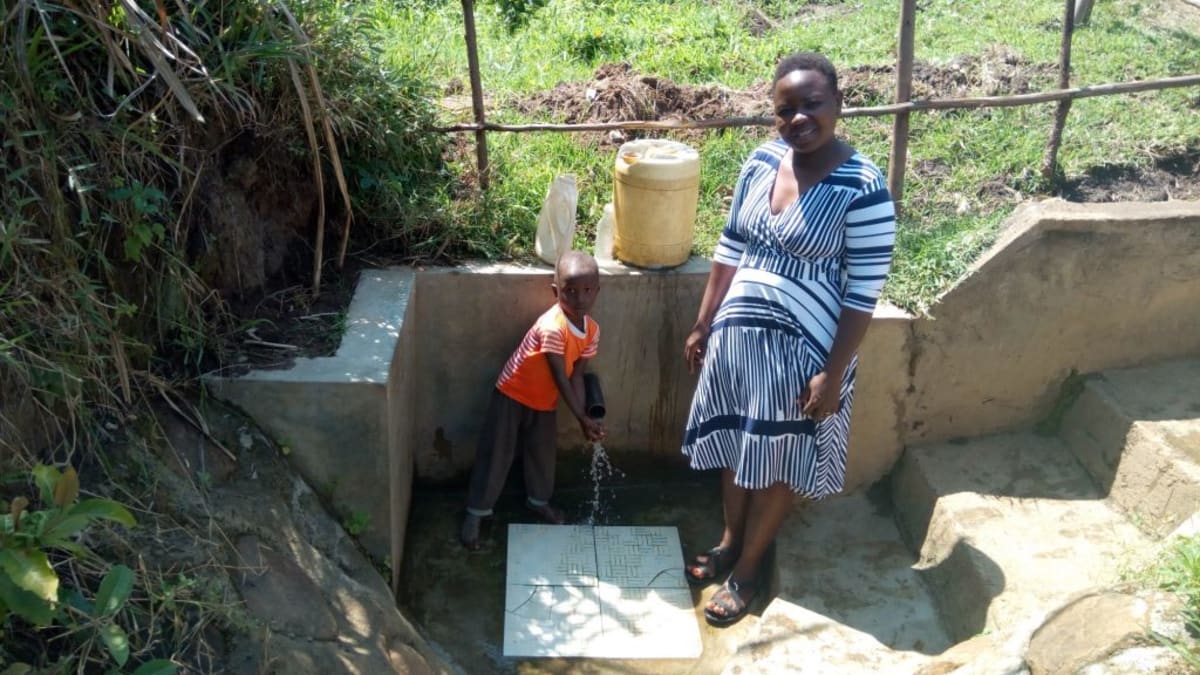This project is a part of our shared program with Western Water and Sanitation Forum (WEWASAFO). Our team is pleased to directly share the below report (edited for clarity, as needed).
Welcome to the Community
A normal day for Emarembwa Community members starts at 6:30 AM. Women and children move back and forth to prepare for breakfast. Women are seen milking cows, after which they take the milk to the shopping center to sell. They turn the earned money around to buy sugar and tea leaves for breakfast. At this point, they are assured of breakfast. Girls are sent to the river while boys are sent to take care of cattle.
Women in this community have come up with a merry-go-round by which they help each other do daily activities like cultivating land and cutting sugarcane, among other activities. This has helped them save both time and money.
Water Situation
Nyangweso Spring is named after Mr. and Mrs. Nyangweso, the landowners.
When girls and other community members fetch water, they go to Nyangweso Spring. This spring is unprotected, which means it is open to contamination from different sources. When it rains, waste is washed into the water. The activities of both animals and humans also contaminate the water, and animals in particular drink straight from the spring.
Some families store their drinking water in covered clay pots, while others use 100 to 200-liter plastic barrels. Many women boil a portion of this water for their families, but community members still suffer from waterborne diseases like typhoid.
Sanitation Situation
Less than half of households here have their own pit latrine. Those we observed are made of old iron sheets and sugar sack doors, and are dirty and smelly. And less tha a quarter of homes have helpful tools like dish racks and clotheslines to dry their belongings.
There were only a couple hand-washing stations spread throughout the community.
Plans: Hygiene and Sanitation Training
Community members will attend hygiene and sanitation training for at least three days. This training will ensure participants are no longer ignorant about healthy practices and their importance. The facilitator plans to use PHAST (Participatory Hygiene and Sanitation Transformation), CLTS (Community-Led Total Sanitation), ABCD (Asset-Based Community Development), group discussions, handouts, and demonstrations at the spring.
Training will also result in the formation of a committee that will oversee operations and maintenance at the spring. They will enforce proper behavior around the spring and delegate tasks that will help preserve the site, such as building a fence and digging proper drainage.
Plans: Sanitation Platforms
On the final day of training, participants will select five families that should benefit from new latrines.
Training will also inform the community and selected families on what they need to contribute to make this project a success. They must mobilize locally available materials, such as bricks, clean sand, hardcore, and ballast. The five families must prepare by sinking a pit for the sanitation platforms to be placed over. All community members must work together to make sure that accommodations and food are always provided for the work teams.
Plans: Spring Protection
Fetching water is predominantly a female role, done by both women and young girls. Protecting the spring and offering training and support will help empower the female members of the community by giving them more time to engage and invest in income-generating activities. In addition, protecting the spring will ensure that the water is safe, adequate and secure. Construction will keep surface runoff and other contaminants out of the water. Village Elder Kizito says "It's just by God’s grace we are still alive; we have really spent a lot of money on medication and this time round we hope to engage in other development activities and redirect our finances to the same."

 Protected Spring
Protected Spring
 Rehabilitation Project
Rehabilitation Project





















